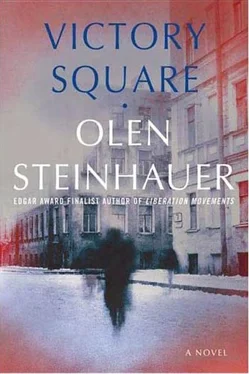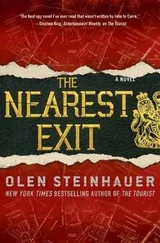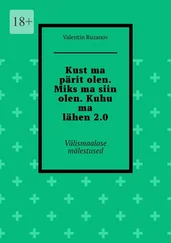Olen Steinhauer - Victory Square
Здесь есть возможность читать онлайн «Olen Steinhauer - Victory Square» весь текст электронной книги совершенно бесплатно (целиком полную версию без сокращений). В некоторых случаях можно слушать аудио, скачать через торрент в формате fb2 и присутствует краткое содержание. Жанр: Политический детектив, на английском языке. Описание произведения, (предисловие) а так же отзывы посетителей доступны на портале библиотеки ЛибКат.
- Название:Victory Square
- Автор:
- Жанр:
- Год:неизвестен
- ISBN:нет данных
- Рейтинг книги:3 / 5. Голосов: 1
-
Избранное:Добавить в избранное
- Отзывы:
-
Ваша оценка:
- 60
- 1
- 2
- 3
- 4
- 5
Victory Square: краткое содержание, описание и аннотация
Предлагаем к чтению аннотацию, описание, краткое содержание или предисловие (зависит от того, что написал сам автор книги «Victory Square»). Если вы не нашли необходимую информацию о книге — напишите в комментариях, мы постараемся отыскать её.
Victory Square — читать онлайн бесплатно полную книгу (весь текст) целиком
Ниже представлен текст книги, разбитый по страницам. Система сохранения места последней прочитанной страницы, позволяет с удобством читать онлайн бесплатно книгу «Victory Square», без необходимости каждый раз заново искать на чём Вы остановились. Поставьте закладку, и сможете в любой момент перейти на страницу, на которой закончили чтение.
Интервал:
Закладка:
I shook my head. “Doesn’t look like it. Was the Lieutenant General on any medication?”
“I don’t know,” said the guard, peering over at Bernard, who had somehow made the shopkeeper laugh. “I wonder what’ll happen to his car now.”
“What?”
“The Lieutenant General’s.” He nodded up the street to where a shining white BMW 7 Series was parked by the curb.
“He parked out in the open?”
“Didn’t trust the garage attendants. Besides, no one’s going to touch a car sitting here.”
I thanked him for the smoke, then hurried across the street to Feder’s hearse. He was just getting behind the wheel. “Let me see the body again.”
“You’re getting creepy in your old age.” He walked with me around the back and opened it so I could climb in to where Kolev was sealed inside a translucent body bag. I unzipped it halfway and reached in. Behind me, Feder made lewd jokes. He said, “Hmm,” when I pulled out Kolev’s car keys.
Bernard had finally tired of pestering the local women, and as he walked back I turned him around and guided him up the street to the BMW. “Quick search,” I said.
“What’re we looking for?”
“Anything. Maybe medication.”
Bernard inhaled audibly when I unlocked the car. Across the way, the guard tossed his cigarette and stared. I took the front seat, rummaging around the floorboards and in the glove compartment, while Bernard crouched in the back. “Hey,” he said.
He held up a narrow sheet of paper-a poorly printed flyer- that said
It was the same slogan they used in Czechoslovakia just before everything changed there. Student radicals and underground workers had used the question-and-answer to identify compatriots. The activists of our own country had borrowed the phrase.
I took the flyer and stared at it.
“What’s wrong?” he said.
I looked at him a second, then past him, through the rear windshield. The guard had returned to the steps of Yalta 36 and was speaking with the other guard. I lowered my voice, though it wasn’t necessary.
“This” I told him. “We’re called in to process the death of a Ministry lieutenant general. Forty years, and I’ve never seen this happen. We’re being brought in for a reason.”
Bernard waited for me to complete my thought, but I couldn’t, not yet. I locked up the BMW, pocketed the keys and thanked the guard again for the cigarette.
Markus Feder was quicker than expected; when we stepped into the homicide office, my phone was ringing. “Emil, I’ve got something.”
“Be right down,” I said, then went out to Bernard, who was settling into his chair. He groaned as he got up again.
We went back down the stairwell to the first underground level and Markus Feder’s “body shop.” Feder had been assigned to the First District Militia in the fifties, and since then he’d gradually built a reputation as the most astute coroner in the country. He was the one who tracked down a rare Nigerian poison used to kill a television broadcaster in 1978. Two years later, he identified not only the weapon-a wrench-that killed the wife of a Ukrainian diplomat, but the manufacturer, the year produced, and the shop where it was purchased. He’d conjured many small miracles in his cold, stainless steel lab, and today was no exception.
“Poisoned,” he said, leaning against the gurney that held Yuri Kolev’s large, naked body aloft. This, for some reason, wasn’t a surprise to me. He raised a finger. “Guess how.”
That, I didn’t know. I shrugged.
“Ever heard of an eight-ball?”
“Billiards?”
Bernard said, “Crack cocaine and heroin.”
Feder wagged the finger at him. “The young man wins. He’s been watching American movies. Anyway, what you’ve got is the same thing but without the crack. Colombian cocaine mixed with heroin.”
“Injected?” I offered.
“Not at all. This man’s been snorting for years. His nasal cavity’s like the Postojna Caves.” Feder propped his gloved finger on the tip of Kolev’s nose to demonstrate. “But this time, it was mixed with uncut heroin. It was pure poison. If his heart hadn’t killed him first, he would’ve suffocated as his body shut down.”
I looked down at Kolev’s pale body and noticed his freshly shaved genitals, which were unusually red. “Could he have done it by accident?”
“Emil, you don’t get hold of pure heroin by accident, and you certainly don’t snort it by accident.”
“What’s wrong with his privates?” said Bernard.
“Herpes,” Feder told him. He wagged his finger again. “A visual lesson for you, son. Oh!”
“What?”
Feder stepped back to the sink and picked up a plastic bag filled with slips of paper, some change, a wallet, and two identification booklets. “His effects.”
I held up the bag and peered through it. “So if it wasn’t an accident, someone spiked his cocaine.”
Feder nodded. “Someone who could get hold of the pure stuff.”
“There you are!” said a woman’s voice. “There’s Daddy!”
Feder brightened, looking past us to where Agota stood in the doorway, clutching two-year-old Sanja wrapped in a purple hooded coat. Agota was beautiful in the way her mother, Magda, had once been, with pale blue eyes and dark hair.
She came in slowly. “We’re interrupting?”
“Absolutely not, dear,” said Feder, a massive grin filling his face.
Bernard waved for her to leave. “I’ll be right out.”
“Yes,” I said, trying to step in front of the corpse. “Go.”
“Oh,” said Agota. She’d just caught sight of Yuri Kolev’s white body. She clutched Sanja tighter, one hand covering the child’s face. “I-”
“Wait outside,” said Bernard.
We watched her retreat and close the door behind herself, then heard coughing from the corridor, and Sanja’s low whine.
“Nice one,” said Feder, a gloved finger on Yuri Kolev’s navel. “I’ve always said your wife was a nice one.”
“Yeah,” Bernard said without interest.
“If I was you, I’d keep a tight rein on myself. A woman like that doesn’t come along every day.”
Bernard looked at Feder, then at me. He blinked and muttered, “Shut up,” before marching out of the lab.
Using Feder’s lamps, I examined Kolev’s effects. He had two ID booklets: a Ministry for State Security certificate with his name, and a general citizen’s pass under the name LIPMANN, ULRICH. He’d used the false one to travel to Sarospatak three times in the last week. It didn’t look like the travel habits of someone who was only making photocopies for the office.
The slips of paper were receipts for four meals at the Hotel Metropol. Large bills, at least three people at the table.
I thanked Feder and found Bernard and Agota whispering in the stairwell, Sanja on her mother’s knee.
“Hey, old man,” said Agota.
Since moving to the Capital in 1984, Agota had gone from disconsolate textile-factory worker to weekend photographer. Then, after one successful commission shooting a Ministry general’s son’s wedding, she started getting calls. She applied for permission to leave her factory just after the birth of her daughter two years ago and had been photographing full-time ever since, sharing a studio co-op on Lenin Avenue, not far from the Militia station. Her life showed us that change was never impossible. She’d married a man ten years youngerthan herself and then became pregnant at the age of forty-five-Katja often spoke of this as if it were a miracle-and then she’d made a complete career change. These things gave the rest of us hope.
I kissed her cheeks, then Sanja’s soft white forehead. “You know better than to walk into that room.”
“I needed to find Berni.” She wrinkled her nose. “But the smell. What is that smell?”
Читать дальшеИнтервал:
Закладка:
Похожие книги на «Victory Square»
Представляем Вашему вниманию похожие книги на «Victory Square» списком для выбора. Мы отобрали схожую по названию и смыслу литературу в надежде предоставить читателям больше вариантов отыскать новые, интересные, ещё непрочитанные произведения.
Обсуждение, отзывы о книге «Victory Square» и просто собственные мнения читателей. Оставьте ваши комментарии, напишите, что Вы думаете о произведении, его смысле или главных героях. Укажите что конкретно понравилось, а что нет, и почему Вы так считаете.












